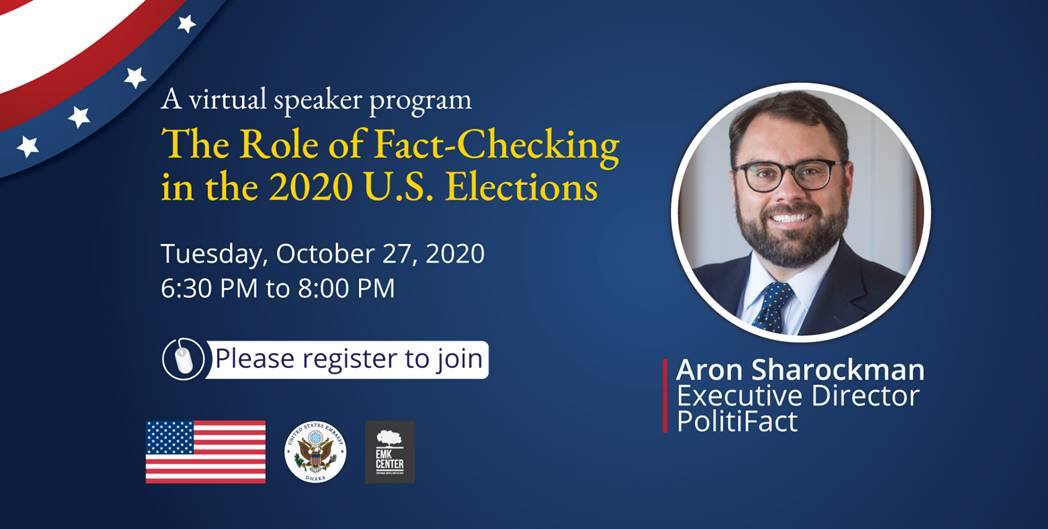American Center of U.S. Embassy Dhaka has organized a virtual discussion on “The Role of Fact-Checking in the 2020 U.S. Elections” with Mr. Aaron Sharockman, Executive Director of PolitiFact, on Tuesday, October 27, 2020. Aaron Sharockman is the Executive Director of PolitiFact, the largest fact checking organization in the United States. Most recently he served as the editor of PunditFact, a website dedicated to checking claims by pundits and others.
He was also the 2016-17 Reynolds Fellow at the Reynolds Journalism Institute at the University of Missouri. Mr. Aaron has discussed different aspects of misinformation, disinformation, and fact-checking with a special focus on fact-checking in U.S. elections.
Bangladesh NGOs Network for Radio and Communication (BNNRC) has mobilized around 55 mainstream and Community Radio Journalists joined the session. Some of the journalists have been shared their feelings and learnings about the session.
Mr. Ruhul Amin Rushd, Senior News Editor, Bangla Vision
I’m feeling very much honored to attend the virtual discussion organized by the American Center of U.S. Embassy Dhaka on “The Role of Fact-Checking in the 2020 U.S. Elections” with Mr. Aaron Sharockman, Executive Director of PolitiFact, yesterday, October 27. It was amazing to know that in partnering with Facebook to fact-check online misinformation, in one six-month span, nearly 400,000 users received notification that they shared false or misleading information. Fact-checking organizations like PolitiFact are checking the claims made by the politicians courageously. The discussion encouraged me to learn more about the fact-checking of our politician’s claims and the progress of their promises.
Mr. Morshed Hassib Hasan, Diplomatic Correspondence, Channel24
Thanks a ton for making such an initiative of Fact-Checking by Politifact. We need to be Bangladeshi journalists to learn and experience such activities in our arena. I believe their suggestions and learnings will help us to grow as better Journalists.
Ms. Priyanka Kundu, Journalist, and Academia
The webinar on the Role of Fact-Checking in the 2020 U.S. Elections held on Tuesday organized by the US Embassy encouraged me to know the fact-checking process online about misinformation, in one six-month span, a large number of users received notification that they shared false or misleading information. Thanks for such an initiative which will help Bangladeshi journalists to learn and experience such activities.
Mr. Awlad Hossain Shebly, Station Manager, Community Radio Bikrampur, Munshigonj.
Fact-checking is essential for broadcasting programs especially election-related programs. It helps community people to realize their democratic rights. Fact-checking in the US is more transparent than in Bangladesh and Community Radios needs to follow the process to confirm information authentically. Fact-checking will help the authority to organize an election free, fair, and accountable to all.
Mr. Monashib Faisal Tonmoy, Station Manager, Community Radio Boral, Bagha, Rajshahi.
A unique process to make the programs reliable and create trust in the radio station as a source of information. Community radios must follow the fact-checking process.
Mr. Rezaul Karim, Program Producer, Community Radio Mahananda, Chapai Nawabgonj
Fact-checking can motivate the voters for selecting reliable leaders for raising their voices in parliament. Misinformation and rumor are a global problem which makes voter confuse and cast votes to wrong candidates. Fact-checking can remove this hesitation and find out the right persons for representing them.
Overall recommendation for future:
- Uses of big data in journalism
- basic skills in data collection and curation
- familiarity with in data visualization software
- basic skills in mapping, network analysis, text analysis for visualization
